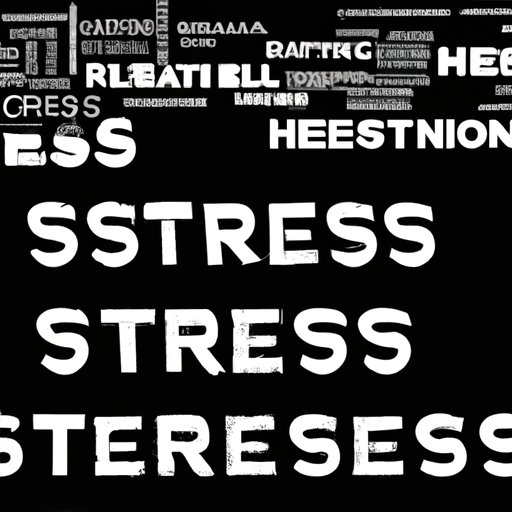Introduction
Stress is a normal psychological and physiological response to life events, such as changes in our environment or perceived threats. Everyone experiences stress at some point in their lives, but it is important to be aware of the effects of stress and develop effective strategies for managing it. In this article, we will explore why stress management is important and provide tips on how to effectively manage stress.

Physical and Mental Health Effects of Stress
Stress can have a significant impact on both our physical and mental health. Physiologically, stress can cause an increase in heart rate, blood pressure, and respiration rate. It can also lead to headaches, digestive issues, and muscle tension. Cognitively, stress can impair our ability to think clearly, remember things, and make decisions. Behavioral effects of stress include irritability, mood swings, and difficulty sleeping. If left unchecked, these effects can lead to more serious health problems, such as anxiety and depression.
Common Causes of Stress
There are many potential sources of stress in our daily lives. Work-related stress is one of the most common sources of stress for adults, often due to long hours, tight deadlines, or job insecurity. Financial stress is another major source of stress, especially when facing debt or unexpected expenses. Family stress can come from parenting challenges, relationship conflicts, or caring for elderly family members. Social stress can arise from heightened expectations or feeling disconnected from others.
Impact of Stress on Productivity
The effects of stress can significantly impact our productivity. When we are stressed, we may struggle to concentrate and make decisions. We may also find ourselves lacking motivation or feeling overwhelmed by tasks. Additionally, long-term stress can lead to burnout, which can leave us feeling exhausted and unable to complete even basic tasks.

Psychological Benefits of Stress Management
Managing stress can have a number of psychological benefits. Proper stress management can help improve our mental clarity, allowing us to think more clearly and make better decisions. It can also help enhance our emotional well-being by reducing feelings of anxiety and helping us feel more in control. Finally, stress management can help us build resilience, enabling us to more effectively cope with future stressful situations.
Identifying and Managing Stressors in Daily Life
The first step in managing stress is identifying the sources of stress in our lives. Once we have identified our stressors, we can begin developing effective coping strategies. These strategies can range from setting realistic goals to breaking up large tasks into smaller ones. Additionally, prioritizing tasks and delegating when possible can help reduce stress.

Simple Tools for Managing Stress
There are a number of simple tools that can be used to effectively manage stress. Exercise is a great way to release built-up tension and reduce stress levels. Meditation can help clear the mind and bring focus to the present moment. Journaling can be used to process emotions and identify patterns in our stress levels. Finally, time management can help us prioritize tasks and stay organized.
Self-Care Practices for Stress Relief
In addition to using specific tools to manage stress, self-care practices can also help reduce stress levels. Getting enough sleep is essential for maintaining good mental and physical health. Eating healthy is important for providing our bodies with the nutrients they need to function properly. Connecting with friends and family can help reduce feelings of isolation and provide support. Taking regular breaks throughout the day can help restore focus and prevent burnout.
Conclusion
Stress is an unavoidable part of life, but proper stress management can help us maintain good physical and mental health. By understanding the sources of stress and developing effective coping strategies, we can reduce its negative effects and lead healthier, more productive lives. Self-care practices, such as getting enough sleep and eating healthy, can also help reduce stress levels and promote overall wellbeing.
(Note: Is this article not meeting your expectations? Do you have knowledge or insights to share? Unlock new opportunities and expand your reach by joining our authors team. Click Registration to join us and share your expertise with our readers.)
